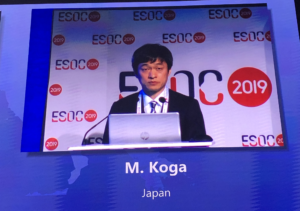
Although an acceptable safety profile was demonstrated for MRI-guided thrombolysis with alteplase at 0.6mg/kg for stroke with unknown time of onset, the latter approach was found comparable to standard medical treatment at 90-days. The results from the THAWS (Thrombolysis for acute wake-up and unclear-onset strokes with alteplase at 0.6mg/kg) trial were presented by Masatoshi Koga (National Cerebral and Cardiovascular Center, Osaka, Japan) at the European Stroke Organisation Conference (ESOC; 22–24 May, Milan, Italy).
Koga alluded to the fact that both the WAKE-UP and EXTEND trials have recently revealed the efficacy of imaging-based intravenous thrombolysis with alteplase at 0.9mg/kg in acute ischaemic stroke patients with unknown time of onset. He said that in Japan, alteplase at 0.6mg/kg is available, based on a single-arm multicentre trial.
Given this, Koga and colleagues set out to test whether alteplast at 0.6mg/kg is safe and effective in patients with wake-up stroke or stroke with unknown onset who had DWI-FLAIR mismatch.
The THAWS (Thrombolysis for acute wake-up and unclear-onset strokes with alteplase at 0.6mg/kg) trial was an investigator-initiated, multicentre, randomised, open-label, blinded endpoint trial. Patients met the standard indication for intravenous thrombolysis, with a time window more than 4.5 hours since last-known-well (wake-up stroke). They were randomly assigned (1:1) to receive alteplase at 0.6mg/kg or standard medical treatment if MRI showed acute ischaemic lesion on DWI and no remarkable corresponding hyperintensity on FLAIR.
 Following the early stop and positive result of the WAKE-UP trial, Koga said that the THAWS trial was prematurely terminated on the 10th July 2018, with 131 of an anticipated 300 patients (55 women, mean age: 74.5±12.2 years, median NIHSS: 7, IQR: 4–13).
Following the early stop and positive result of the WAKE-UP trial, Koga said that the THAWS trial was prematurely terminated on the 10th July 2018, with 131 of an anticipated 300 patients (55 women, mean age: 74.5±12.2 years, median NIHSS: 7, IQR: 4–13).
At this point, the primary outcome (mRS 0–1 at 90 days) was comparable between the alteplase group (32/68, 47.1%) and the control group (28/58, 48.3%) (RR: 0.97; 95% CI: 0.68 to 1.41; p=0.892).
However, safety outcomes were found to be very similar, as symptomatic intracranial haemorrhage within 22–36 hours occurred in 1/71 (1.4%) and 0/60 (0%; RR, infinity; 95% CI: 0.06 to infinity; p=1.0), respectively. Further, death at 90 days occurred in 2/71 (2.8%) and 2/60 (3.3%; RR: 0.85; 95% CI: 0.06 to 12.58; p=1.0), respectively.
In light of these findings, Koga later stated in an ESO interview, “We managed to show an acceptable safety profile for alteplase for patients with wake up stroke, but we could not show the difference in favourable outcome between rtPA and the controls.”
When further questioned on whether the low rate of symptomatic ICH was due to the low dose of alteplase, Koga said, “It could be, but also the patient selection was very important.”
Providing an explanation as to why the trial was neutral in comparison to the WAKE-UP trial’s positive result, he speculated, “Because of the small number of patients and the prematurely terminated trial… it is difficult to conclude. It could be due to the early initiation of antithrombotics, it could be by chance or because of a difference in dose.”
When asked if he would have preferred to have continued the trial to achieve the target sample size, Koga put forward: “While funding is limited, we working with the WAKE UP group and the EXTEND group and we are planning to conduct a meta-analysis on individual patient data soon… so we decided to terminate the trial.”
In the same ESO interview, Manabu Inoue (National Cerebral and Cardiovascular Center, Osaka, Japan) another investigator of THAWS, said, “We definitely think there is room for more research in this area. For instance, we only had a small number of patients and in collaboration with other similar trials we will expand the numbers [which] of course, this will really magnify the impact of this trial. But in future, we might think of another tPA, such as tenecteplase, that might be another option for all these wake-up trials as well.













